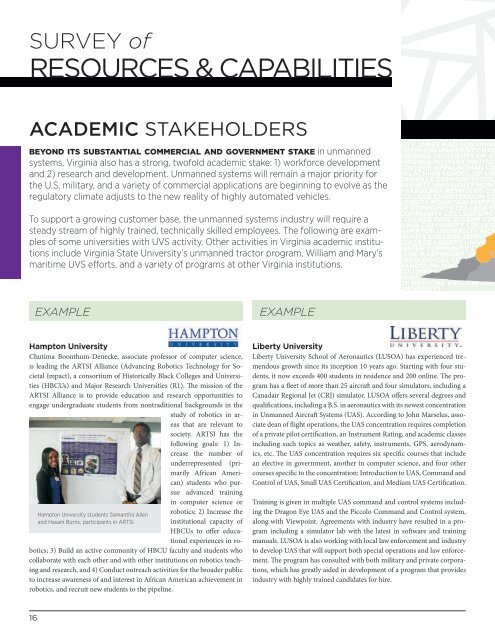UNMANNED VEHICLE SYSTEMS
You also want an ePaper? Increase the reach of your titles
YUMPU automatically turns print PDFs into web optimized ePapers that Google loves.
SURVEY of<br />
RESOURCES & CAPABILITIES<br />
ACADEMIC STAKEHOLDERS<br />
beyond its substantial commercial and goVernment stake in unmanned<br />
systems, Virginia also has a strong, twofold academic stake: 1) workforce development<br />
and 2) research and development. Unmanned systems will remain a major priority for<br />
the U.S. military, and a variety of commercial applications are beginning to evolve as the<br />
regulatory climate adjusts to the new reality of highly automated vehicles.<br />
To support a growing customer base, the unmanned systems industry will require a<br />
steady stream of highly trained, technically skilled employees. The following are examples<br />
of some universities with UVS activity. Other activities in Virginia academic institutions<br />
include Virginia State University’s unmanned tractor program, William and Mary’s<br />
maritime UVS efforts, and a variety of programs at other Virginia institutions.<br />
CHRISTOPHER NEWPORT UN<br />
SITY JAMES MADISON UNIVE<br />
DOMINION UNIVERSITY RAD<br />
VIRGINIA UNIVERSITY OF VI<br />
VIRGINIA MILITARY INSTITUT<br />
COLLEGE APPALACHIAN CO<br />
PALACHIAN SCHOOL OF LAW<br />
DANVILLE COMMUNITY COL<br />
AVERETT UNIVERSITY NON-T<br />
J SARGEANT REYNOLDS CO<br />
COLLEGE CHRISTENDOM CO<br />
VERSITY MOUNTAIN EMPIRE<br />
ER COMMUNITY COLLEGE ED<br />
COMMUNITY COLLEGE EMOR<br />
COLLEGE PAUL D CAMP COM<br />
GINIA COMMUNITY COLLEGE<br />
HAMPTON UNIVERSITY RICH<br />
MUNITY COLLEGE JEFFERSO<br />
COLLEGE LIBERTY UNIVERSI<br />
WATER COMMUNITY COLLEG<br />
LEGE MARYMOUNT UNIVERS<br />
THEOLOGICAL SEMINARY IN<br />
RANDOLPH-MACON COLLEG<br />
SOUTHERN VIRGINIA UNIVER<br />
GINIA UNIVERSITY OF RICHM<br />
OF MEDICINE VIRGINIA UNIO<br />
UNIVERSITY<br />
EXAMPLE<br />
EXAMPLE<br />
Hampton University students Samantha Allen<br />
and Hasani Burns, participants in ARTSI.<br />
Hampton University<br />
Chutima Boonthum-Denecke, associate professor of computer science,<br />
is leading the ARTSI Alliance (Advancing Robotics Technology for Societal<br />
Impact), a consortium of Historically Black Colleges and Universities<br />
(HBCUs) and Major Research Universities (R1). The mission of the<br />
ARTSI Alliance is to provide education and research opportunities to<br />
engage undergraduate students from nontraditional backgrounds in the<br />
study of robotics in areas<br />
that are relevant to<br />
society. ARTSI has the<br />
following goals: 1) Increase<br />
the number of<br />
underrepresented (primarily<br />
African American)<br />
students who pursue<br />
advanced training<br />
in computer science or<br />
robotics; 2) Increase the<br />
institutional capacity of<br />
HBCUs to offer educational<br />
experiences in robotics;<br />
3) Build an active community of HBCU faculty and students who<br />
collaborate with each other and with other institutions on robotics teaching<br />
and research, and 4) Conduct outreach activities for the broader public<br />
to increase awareness of and interest in African American achievement in<br />
robotics, and recruit new students to the pipeline.<br />
Liberty University<br />
Liberty University School of Aeronautics (LUSOA) has experienced tremendous<br />
growth since its inception 10 years ago. Starting with four students,<br />
it now exceeds 400 students in residence and 200 online. The program<br />
has a fleet of more than 25 aircraft and four simulators, including a<br />
Canadair Regional Jet (CRJ) simulator. LUSOA offers several degrees and<br />
qualifications, including a B.S. in aeronautics with its newest concentration<br />
in Unmanned Aircraft Systems (UAS). According to John Marselus, associate<br />
dean of flight operations, the UAS concentration requires completion<br />
of a private pilot certification, an Instrument Rating, and academic classes<br />
including such topics as weather, safety, instruments, GPS, aerodynamics,<br />
etc. The UAS concentration requires six specific courses that include<br />
an elective in government, another in computer science, and four other<br />
courses specific to the concentration: Introduction to UAS, Command and<br />
Control of UAS, Small UAS Certification, and Medium UAS Certification.<br />
Training is given in multiple UAS command and control systems including<br />
the Dragon Eye UAS and the Piccolo Command and Control system,<br />
along with Viewpoint. Agreements with industry have resulted in a program<br />
including a simulator lab with the latest in software and training<br />
manuals. LUSOA is also working with local law enforcement and industry<br />
to develop UAS that will support both special operations and law enforcement.<br />
The program has consulted with both military and private corporations,<br />
which has greatly aided in development of a program that provides<br />
industry with highly trained candidates for hire.<br />
16



